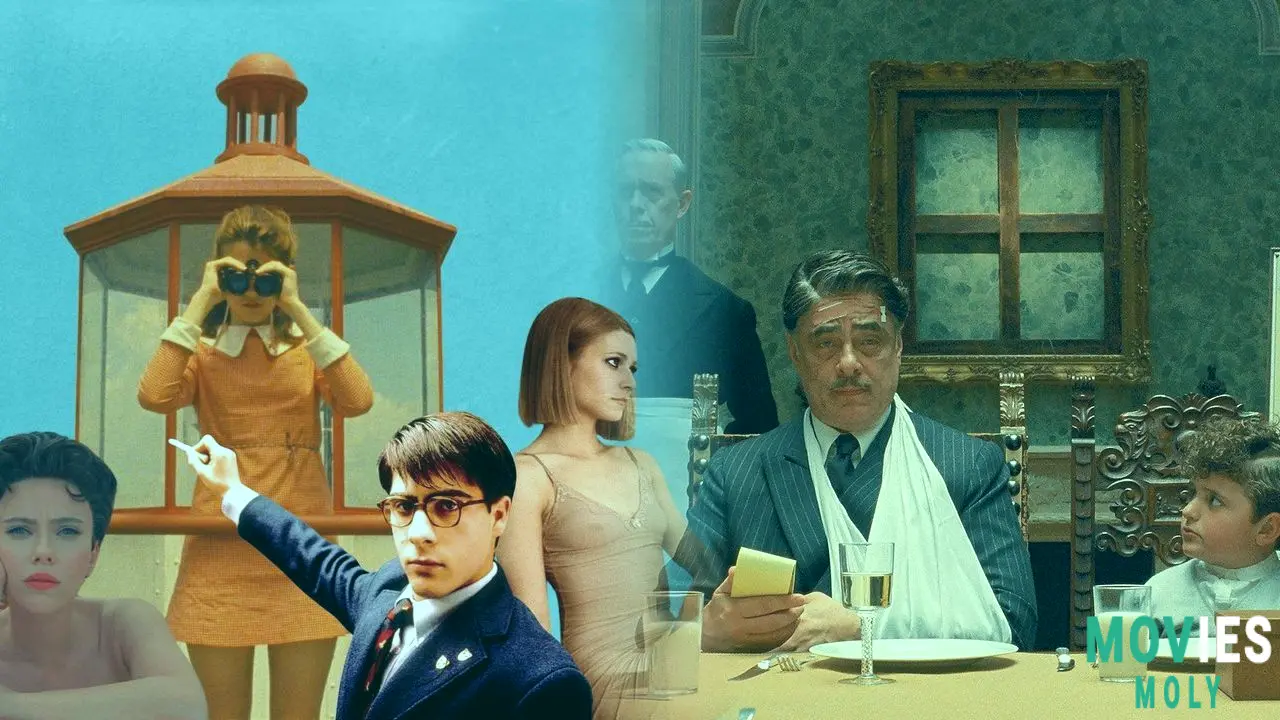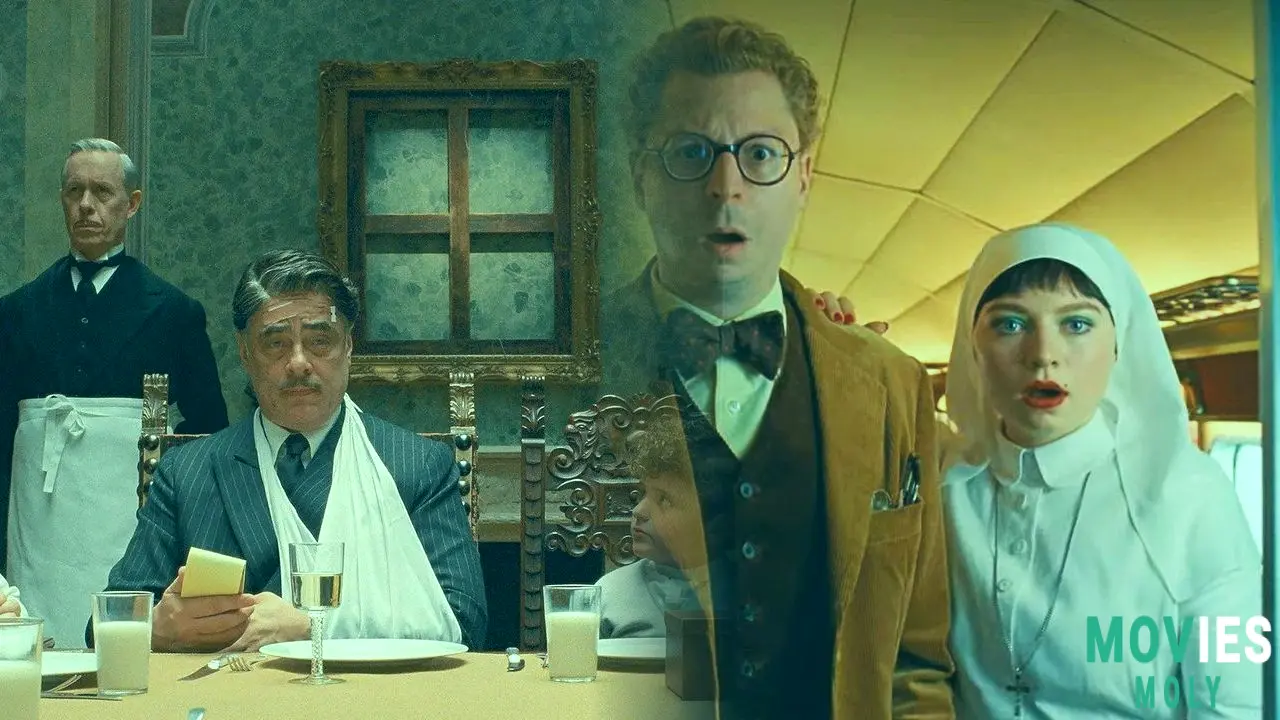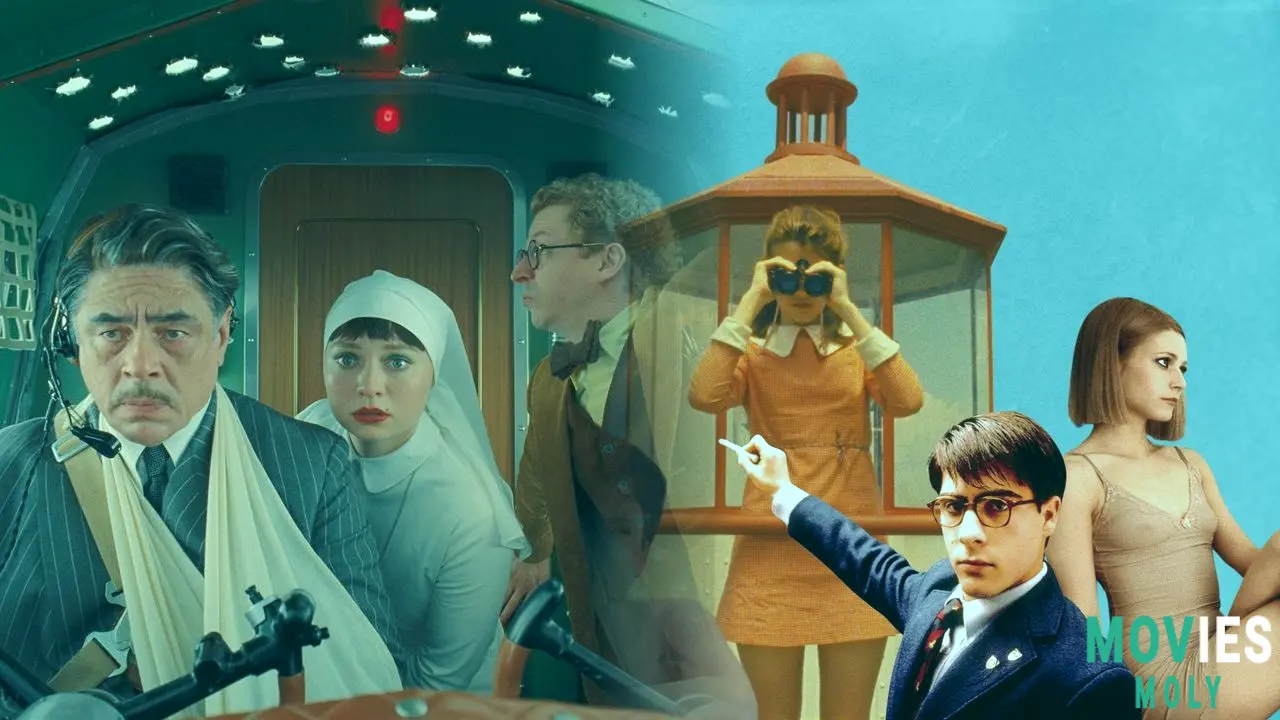In almost thirty years since his first movie, Bottle Rocket, Wes Anderson’s style has become so easy to spot. It even turned into a popular online trend that the director himself does not seem to care much about. To be fair, a quick video on TikTok does not really show the deep thought and effort that goes into Anderson’s films. People have accused Anderson of many things: focusing on looks over deeper meaning, being too sarcastic to have real feelings, relying too much on old memories, and being too picky for his own good.
But his fans know that inside all the colorful scenes, perfectly balanced shots, and soft colors, are movies full of deep feelings. It certainly helps that he keeps working with some of the best actors in Hollywood. Ralph Fiennes, Owen Wilson, Jason Schwartzman, Scarlett Johansson, and his go-to guy Bill Murray all help deliver his messages with their distinct deadpan charm. He truly makes these actors shine.
With his first few movies, Rushmore and The Royal Tenenbaums, Anderson made carefully designed comedies that were funny but also sad. They were about pain, families that did not work well together, and feeling alone. As he got older as a filmmaker, his movies also changed. His more recent pictures like The French Dispatch and Asteroid City used complicated, connected stories to talk about death, feeling lost, and controlling power. All these ideas are part of his newest movie, The Phoenician Scheme. It is a dark comedy about a very rich man, played by Benicio del Toro, who has to make things right with his daughter if he wants his shaky reputation to last.
What Makes A Wes Anderson Film Instantly Recognizable To Longtime Viewers?From Symmetrical Shots To The Same Talented Faces Appearing Again And Again On Screen
Anderson’s movies are always different and never simple. Many people are still trying to figure out the line from Asteroid City, "You can’t wake up if you don’t fall asleep." This is why some viewers find it hard to connect with his films. But the more you watch of his work, and yes, his 2023 short films like The Wonderful World of Henry Sugar made my list, the clearer it becomes. He is a director who truly understands the hard and sad facts of the world. He just chooses to wrap it all up in a pretty, pastel bow to keep audiences guessing. For me, that is part of the fun.
His earliest film, Bottle Rocket, released almost 20 years ago, does not really show the brilliant style that would come later. This is not meant as a slight to Bottle Rocket. It is a charming crime comedy about two small-town criminals, played by brothers Owen and Luke Wilson. They are not playing brothers in the movie, even though they sound like they are from Texas. (Their older brother, Andrew, also shows up playing another character’s brother.) But this movie feels much more free-spirited than anything Anderson would do now.
Back then, Anderson thought he would follow John Cassavetes, an early independent filmmaker known for his raw, unplanned directing. This looser style works for the smaller scale of Bottle Rocket. It starts with Luke Wilson’s Anthony leaving a voluntary treatment place in Arizona after a breakdown. There is a spontaneous energy to everything his not-so-smart friend Dignan, played by Owen, does. Dignan wants to help Anthony by bringing him into a group of part-time criminals. Their leader is Mr. Henry, played by James Caan. The two rob a local bookstore. No surprise, the job does not go as planned. They end up hiding in a motel where Anthony falls for Inez, a housekeeper who only speaks Spanish. This movie is genuinely sweet and shows a different side of Anderson.
The movie’s MVP: Owen Wilson as Dignan. He is a good-hearted slacker with big, silly dreams. It is easy to laugh at his 75-year plan about crime and yard work, but you have to respect his determination.
Unpacking The Evolution Of Wes Anderson's Characters And Storytelling From His Early Works To Now

How Themes Of Family, Grief, And Isolation Are Explored Through His Distinctive Style
The Royal Tenenbaums, taking cues from authors like J.D. Salinger, is a sad comedy about a broken family of former child stars. When the charming but absent father, Royal Tenenbaum, played by Gene Hackman, loses his home, he seeks help from his ex-wife, Anjelica Huston, and his three unlucky kids. There is Richie, a disgraced tennis player, played by Luke Wilson. Then there is Chaz, a recently widowed father, played by Ben Stiller. And finally, his adopted playwright daughter, played by Gwyneth Paltrow. Royal’s estranged family is not interested in getting back together. So, to get back into their lives, and more importantly, into their grand New York City home, he pretends to be dying.
Anderson has always been interested in the complicated connections between parents and children. This is especially true for those trying to fix things. But out of all his bad dads, Royal might be the worst. Early in the film, Royal cannot seem to say or do the right things. It is only because of his two grandchildren, who wear red Adidas tracksuits and are trying to find their own way under their strict father, that Royal feels he has to become the dad his once-gifted children need. Full of sadness and regret, The Royal Tenenbaums is a touching story about a man who finally learns to put others first. It is a movie that makes me cry every time I watch it.
The movie’s MVP: Gene Hackman as Royal Tenenbaum. Bill Murray reportedly said Hackman was not the easiest to work with on set. But maybe Hackman’s tough nature is what makes Royal Tenenbaum such a lovable grumpy old man. Just watch his final scene with Stiller’s Chas. It is hard not to cry.
Fantastic Mr. Fox, Anderson’s first stop-motion movie and first book adaptation by Roald Dahl, is a fun take on a classic story. Mr. Fox, a clever but quick-to-act robber turned newspaper writer, voiced by George Clooney, gives up stealing to raise a family. His wife, Meryl Streep, his odd son, Jason Schwartzman, and his quiet nephew, Eric Anderson, are all there. Lately, though, he misses the excitement of his old life. When he gets a chance to steal from his mean farmer neighbors, he takes it. He hopes it will give his family a better life and also bring back his own spark.
It is a classic "one last job" story led by detailed animal characters. And like those stories, everything goes wrong. Mr. Fox gets attacked by a violent bodyguard rat, played by Willem Dafoe. He also fights a crazy beagle and almost drowns in a river of cider. His actions almost get his poor neighbors killed. Mr. Fox soon learns that to be a better husband, father, and friend, he must put those he loves before his own desires. This film feels like a wolf in sheep’s clothing. On the outside, it looks like a sweet children’s movie about a fox whose pride gets in the way of loving others. On the inside, Fantastic Mr. Fox is a smart and very honest look at a dad having a midlife crisis. It is a brilliant idea for a stop-motion picture.
The movie’s MVP: George Clooney as Mr. Fox. He brings a perfect mix of charm and ego to a character who is trying to find himself again.
Wes Anderson's Recent Works and The Enduring Appeal of His Distinct Cinematic Universe

Looking At How The Director Continues To Challenge Himself And His Audience
Anderson’s most acclaimed film, The Grand Budapest Hotel, shows everything he had perfected up to that point. It has ornate camera work, stop-motion, painted backdrops, and great ensemble casts. He added new touches too, like boxier frames and different story structures. He made a colorful, wild adventure about M. Gustave, a charming hotel concierge played by Ralph Fiennes, and Zero, his lobby boy, played by Tony Revolori. Gustave inherits a valuable painting from a rich old woman he knew. He then becomes the target of her evil son, played by Adrien Brody, her lawyer, played by Jeff Goldblum, and a hitman, played by Willem Dafoe. Soon, Gustave and Zero go on a wild chase through the made-up European country of Zubrowka just before World War II.
Throughout this adventure that spans many years, Anderson plays with the old-fashioned charm of Central European buildings and ways of life. He also hints at the real-world political problems of that time. It makes for a thoughtful and timeless look at what we lose when we stop being polite to each other. This movie is a masterpiece, and it really shows how much Anderson has grown as a filmmaker. I find something new to appreciate every time I watch it.
The movie’s MVP: Ralph Fiennes as M. Gustave. He should have won an Oscar for his perfect acting. He plays an old-world gentleman who likes older women and good manners. The fact he was not even nominated is truly sad.
His latest film, The Phoenician Scheme, is like a set of Russian nesting dolls. The complicated plot, which might be too complex for some, is literally hidden in shoeboxes. Benicio del Toro plays Zsa Zsa Korda, a cold industrialist. After barely surviving another attempt on his life, he believes his ongoing business idea will get him killed. To keep his international construction plan going, he asks his estranged daughter, Liesel, a nun-in-training, played by Mia Threapleton, to be the only heir to his family fortune. His harsh business methods, like using slave labor and causing famine, do not sit well with her holy goals. To get what he wants, he has to choose between building his fortune and saving his humanity. Taking cues from spy novels and older films, Anderson creates a family drama about the fight for the soul of capitalism. It is also one of his funniest movies in years. The way he mixes humor with serious ideas is something I really enjoy.
The movie’s MVP: Benicio del Toro as Zsa Zsa Korda. He has a sad yet threatening look that perfectly shows the bitter billionaire having a bad moment. He makes you feel for him even when he is doing terrible things.
Wes Anderson continues to create unique and thought-provoking films. His commitment to his distinct style, recurring actors, and deep themes keeps audiences coming back. Whether you love his specific humor or find his stories challenging, there is no denying his place as a truly special director. He continues to make movies that are worth talking about, debating, and watching many times over.



